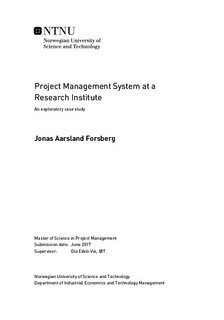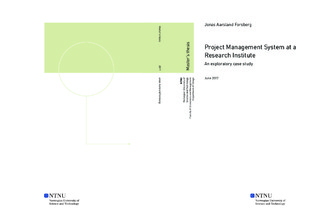| dc.description.abstract | .Projects have become a more central way of organizing work in today's fast phased and competitive environment. Projects can be defined as a temporary organization which operates under the constraints of time, budget, and other resources. Within specified timeframe, an organization can be defined as permanent entity and projects as temporary. Here, a potential complication arises, between the temporary and permanent. In this interaction, some level of guidance and control are required. This study has addressed how to handle this interface from a project management perspective and has defined this interface as a Project Management System (PMS). To narrow the focus, a project-based organization, more specifically a research institute has been selected as a focal point. This has resulted in an explicit standardized project management (SPM) system for the research institute, and a general PMS, which ban be beneficial for project-based organizations.
These findings are based on an exploratory case study. 11 project practitioners in a research institute were interviewed regarding the PMS and its aspects. The project practitioners ranged from experienced project managers, department heads, and other executives in the organization. The widespread sample of project practitioners made it possible to create a more practical and specified SPM system which is connected to the project reality and organizational capabilities. One of the theoretical findings suggests that it is not beneficial to control a complex project reality using linear systems. Instead, an adaptable approach directed towards the project reality and dynamics is more advantageous. A flexible approach was developed by making a project categorization system which is a part of the SPM system. This can be used as a tool to separate the projects from each other based on their intrinsic nature. From these separations, a more detailed project management approach can be valuable. The application and benefits of the SPM have been investigated. The study concludes with a model of a holistic PMS and how it can be connected and created to enhance project success | en |

